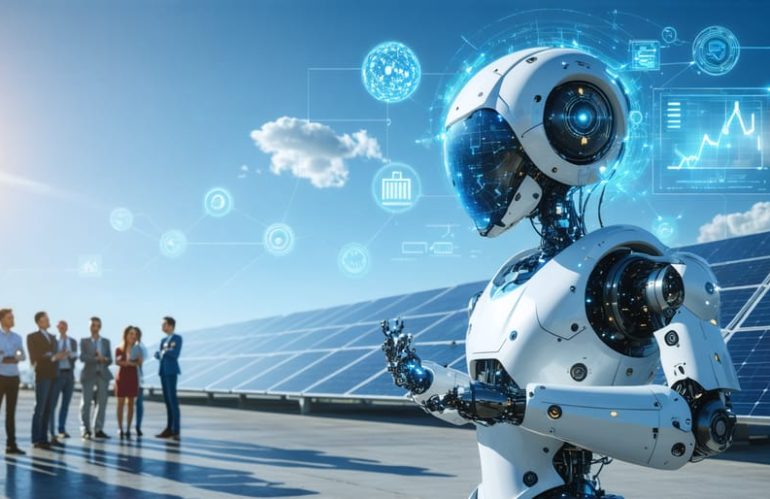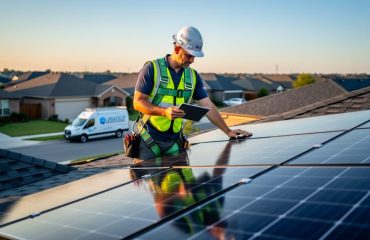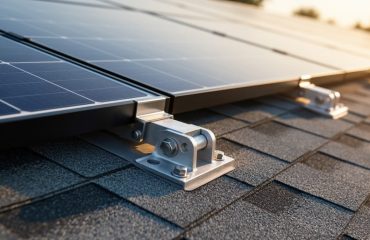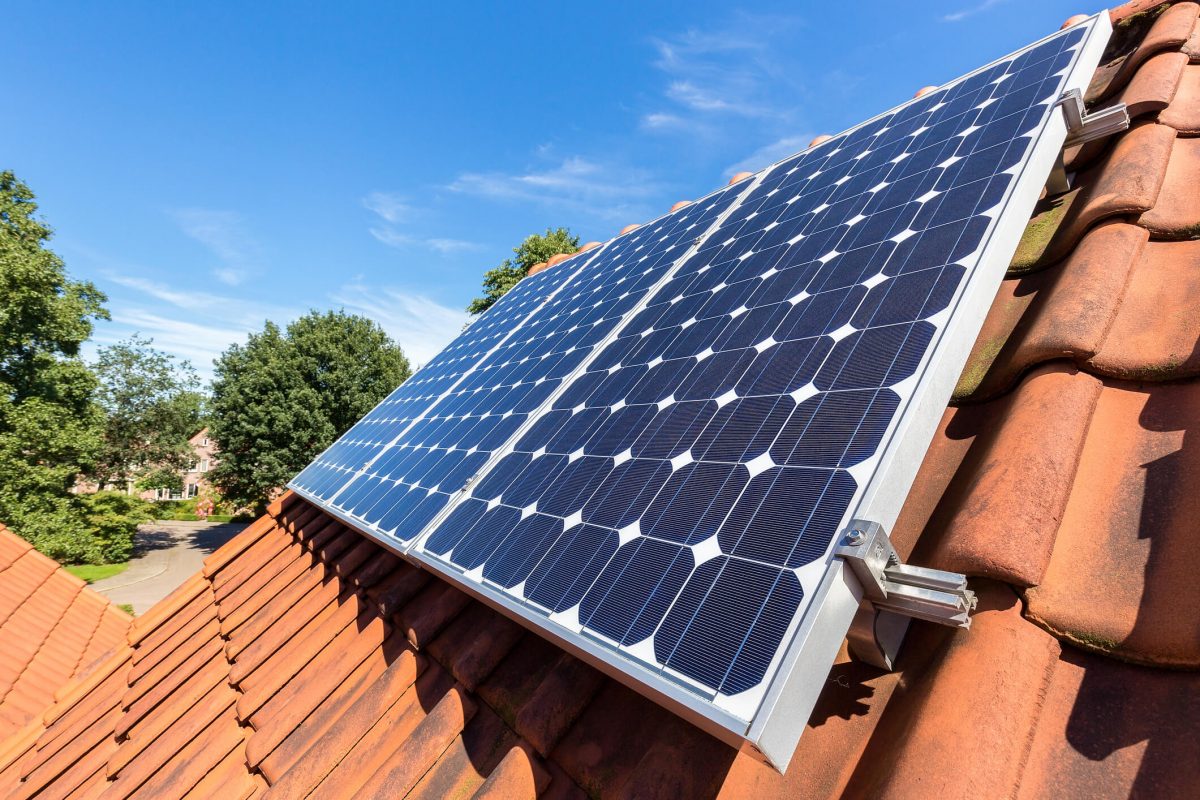Online chatbots powered by artificial intelligence are revolutionizing how businesses connect with customers, delivering 24/7 support while reducing operational costs by up to 30%. These intelligent virtual assistants now handle everything from basic inquiries to complex transactions, using natural language processing to understand and respond to customer needs with unprecedented accuracy. In 2024, AI chatbots have evolved beyond simple scripted responses, leveraging machine learning to provide personalized experiences, anticipate customer needs, and seamlessly integrate with existing business systems. For organizations looking to enhance customer service while optimizing resources, AI chatbots represent a strategic investment that combines the best of human-like interaction with the efficiency of automation.
Research shows that properly implemented chatbots can resolve up to 80% of routine customer queries without human intervention, dramatically improving response times and customer satisfaction. This technology isn’t just about automation – it’s about creating smarter, more efficient ways to serve customers while freeing human agents to focus on complex issues that require emotional intelligence and nuanced problem-solving skills.
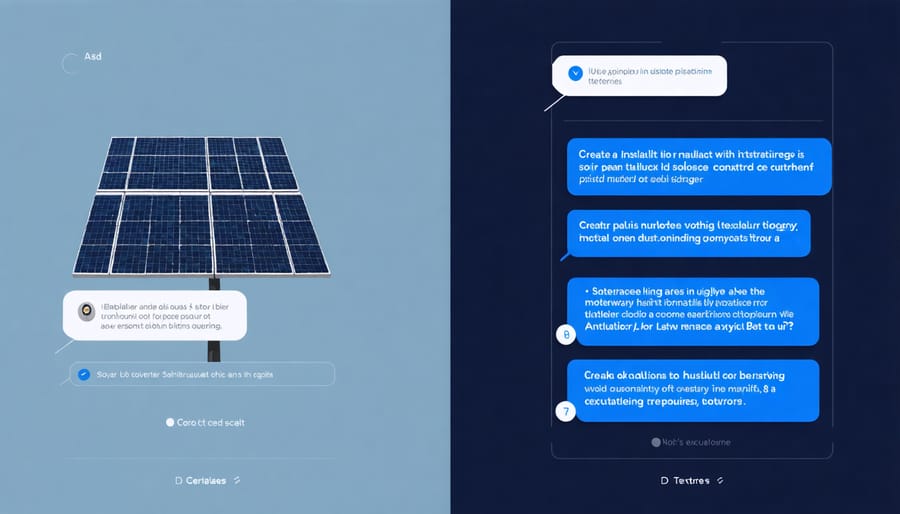
How AI Chatbots Transform Solar Customer Service
24/7 Solar Support Without the Wait
Gone are the days of waiting on hold or scheduling appointments just to get answers about your solar system. Modern AI chatbots provide instant, accurate responses to your solar-related questions any time of day or night. Whether you’re wondering about your system’s performance at midnight or need troubleshooting help during a holiday, these digital assistants are always ready to help.
These intelligent chatbots can handle multiple customer inquiries simultaneously, eliminating wait times completely. They’re programmed with extensive knowledge about solar systems, from basic maintenance questions to complex technical issues, ensuring you get reliable information when you need it most.
Unlike human support teams, AI chatbots don’t need breaks, vacations, or sick days. They maintain consistent service quality around the clock, making solar support more accessible than ever before. For situations requiring human expertise, these systems can quickly escalate issues to the appropriate team while keeping you informed throughout the process.
Personalized Energy Savings Conversations
Modern AI chatbots revolutionize how homeowners explore solar energy options by delivering personalized solar solutions through intelligent conversations. These advanced systems analyze your home’s specific details, energy consumption patterns, and local climate data to provide accurate savings estimates and tailored recommendations.
By asking targeted questions about your roof size, current electricity bills, and energy goals, chatbots can instantly calculate potential solar savings and system requirements. They help demystify the solar adoption process by explaining available incentives, financing options, and expected return on investment in clear, simple terms.
What makes these AI conversations particularly valuable is their ability to adapt to your knowledge level and concerns. Whether you’re worried about installation costs or curious about battery storage, the chatbot provides relevant information and addresses your specific questions, making solar energy decisions more accessible and less overwhelming.
Real Solutions Your Solar Customers Actually Want
Quick Answers to Common Solar Questions
Modern AI chatbots excel at providing instant answers to common solar-related questions, making them invaluable for both customers and solar companies. These virtual assistants can quickly address queries about solar panel costs, installation timelines, and potential energy savings without human intervention.
Chatbots can instantly calculate rough estimates for solar system sizes based on home square footage and energy usage patterns. They provide immediate information about available tax incentives, rebates, and financing options in specific locations. When customers ask about maintenance requirements, chatbots deliver clear guidelines and scheduling options for professional inspections.
These AI assistants also excel at explaining technical concepts in simple terms, such as how net metering works or the difference between monocrystalline and polycrystalline panels. They can provide real-time updates on installation progress, schedule site assessments, and even help troubleshoot basic system issues.
For solar companies, this means faster response times, reduced customer service costs, and more informed clients. The ability to handle routine inquiries 24/7 allows human staff to focus on more complex consultations and sales opportunities.
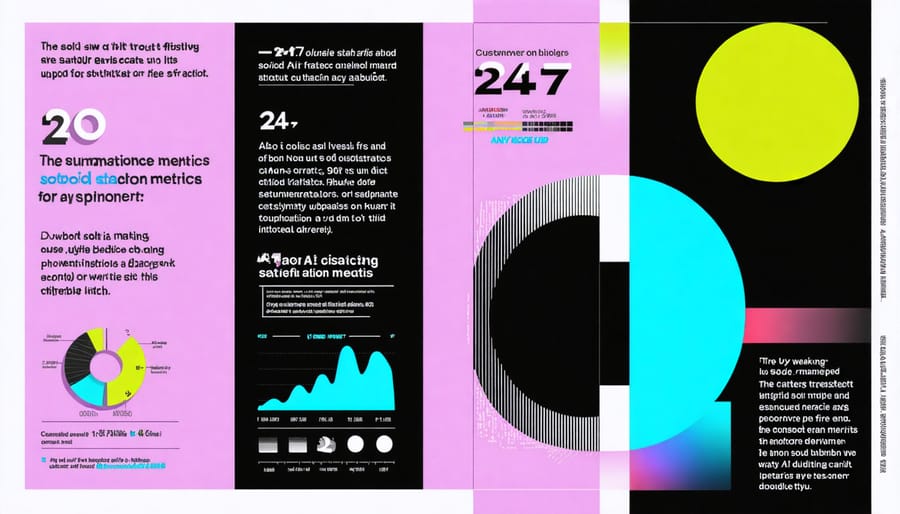
Smart Scheduling and Quote Estimates
Modern AI chatbots have revolutionized how businesses handle scheduling and quote generation, making these processes seamless and instantaneous. Rather than waiting for business hours to book an appointment or receive a quote, customers can interact with intelligent chatbots 24/7 to find suitable time slots and get preliminary cost estimates.
These smart scheduling assistants can sync with your business calendar in real-time, automatically offering available time slots while considering factors like staff availability and service duration. When a customer selects their preferred time, the chatbot can instantly confirm the appointment and send automated reminders as the date approaches.
For quote generation, chatbots use dynamic questioning to gather essential information about the customer’s needs. By asking targeted questions and processing responses instantly, they can provide accurate preliminary quotes based on your predefined pricing models. This capability is particularly valuable for service-based businesses where pricing depends on multiple variables.
The real power lies in integration – these chatbots can connect with your CRM, scheduling software, and pricing databases to deliver a unified experience that feels personal and professional. This automation not only saves time for both customers and staff but also reduces the likelihood of scheduling conflicts and quote miscalculations.
Making Your Solar AI Chatbot Work Smarter
Teaching Your Chatbot Solar Speak
Training your AI chatbot to understand solar terminology is essential for providing accurate and helpful customer support. Start by creating a comprehensive knowledge base that includes common solar terms, system components, and frequently asked questions. Include definitions for terms like photovoltaic panels, inverters, and net metering in simple, accessible language.
Next, develop conversation flows that mirror typical customer inquiries about solar installations, maintenance, and savings. Your chatbot should recognize variations of common questions, such as “How much can I save with solar?” or “What size system do I need?” Feed it with relevant responses that include both technical information and practical benefits.
Consider regional factors when training your chatbot. Include information about local solar incentives, weather patterns, and installation requirements specific to different areas. This helps provide more accurate and personalized responses to potential customers.
Make sure your chatbot can handle basic troubleshooting questions by incorporating common solar system issues and their solutions. Train it to recognize when a query requires human intervention, especially for complex technical problems or custom quotes.
Don’t forget to regularly update your chatbot’s knowledge base with new solar technologies, changing regulations, and emerging industry trends. This ensures your virtual assistant remains current and continues to provide valuable support to your customers. Test the chatbot regularly with real-world scenarios to refine its responses and improve accuracy.
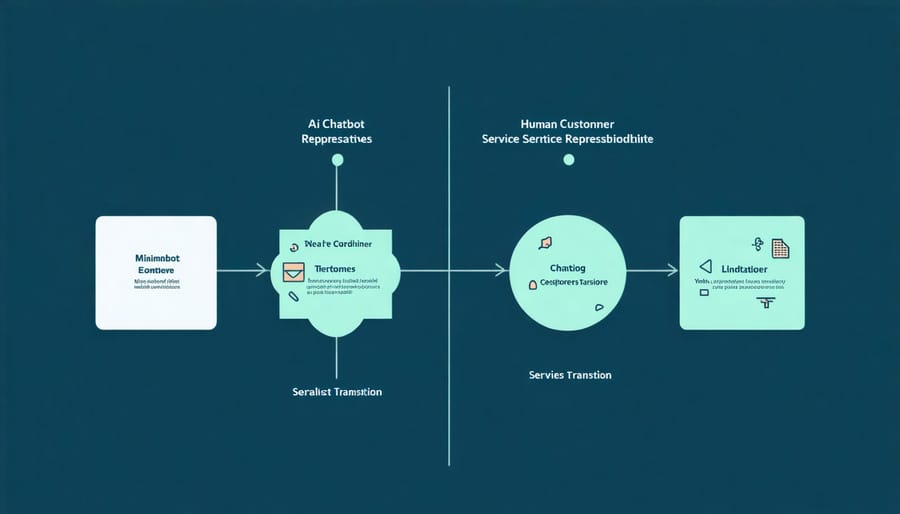
Seamless Human Handoff
While AI chatbots can handle many customer inquiries efficiently, there are times when human intervention becomes necessary. The key is recognizing when to make this transition smoothly to maintain customer satisfaction. Complex issues, such as customized solutions or emotional situations, often require a human touch that AI cannot fully replicate.
Effective handoff triggers should be established based on specific scenarios, such as when customers express frustration, request to speak with a human representative, or when the conversation involves sensitive personal information. The transition should be immediate and transparent, with the chatbot acknowledging its limitations and informing the customer that they’re being connected to a human agent.
To ensure a seamless transition, implement a system that transfers the entire conversation history to the human agent, preventing customers from having to repeat their concerns. This approach saves time and reduces frustration. Train your human support team to quickly review the AI interaction before engaging with the customer, ensuring continuity in the conversation.
Consider implementing a feedback loop where human agents can flag conversations that required their intervention. This information helps improve the AI system’s capabilities and refine handoff triggers over time. Remember, the goal is to combine the efficiency of AI with the empathy and problem-solving abilities of human agents for the best possible customer experience.
Measuring Success: Beyond Basic Customer Service
Measuring the success of AI chatbots goes beyond simple customer satisfaction metrics. While response times and resolution rates remain important, modern solar companies need a comprehensive approach to evaluate their chatbot performance. Key performance indicators (KPIs) should align with both operational efficiency and customer experience goals.
Essential metrics include conversation completion rates, which show how effectively chatbots guide users through their inquiries, and containment rates, indicating the percentage of interactions resolved without human intervention. Successful solar chatbots typically achieve containment rates of 70-80% for common queries like installation scheduling and basic troubleshooting.
Another crucial metric is the accuracy of information provided. This can be tracked through customer feedback and service quality surveys following chatbot interactions. Effective chatbots should maintain an accuracy rate above 90% for consistent customer trust.
User engagement metrics, such as average conversation duration and user return rates, help determine if the chatbot successfully keeps customers engaged while providing valuable assistance. A well-implemented chatbot should show increasing user return rates over time, indicating growing customer confidence in the system.
Cost savings metrics are equally important, including reduced customer service staff hours and decreased response times. Successful solar companies typically report 25-30% reduction in customer service costs after implementing AI chatbots. Remember to track lead generation metrics as well, measuring how effectively your chatbot converts inquiries into qualified solar installation leads.
Finally, monitor customer satisfaction scores specifically related to chatbot interactions, aiming for satisfaction rates comparable to or exceeding those of human agents. This holistic approach to measurement ensures your chatbot continues to deliver value while supporting your solar business’s growth objectives.
As we’ve explored throughout this article, AI chatbots are revolutionizing solar customer support by providing immediate, accurate, and personalized assistance around the clock. These intelligent virtual assistants not only streamline operations but also significantly enhance customer satisfaction through quick response times and consistent service quality. By implementing AI chatbots, solar companies can reduce operational costs while simultaneously improving their customer experience – a win-win situation for both businesses and homeowners.
The data speaks for itself: faster query resolution, increased customer engagement, and substantial cost savings make AI chatbots an invaluable tool in today’s competitive solar market. For homeowners, this means easier access to information about solar installations, maintenance schedules, and energy savings calculations, all available instantly at their fingertips.
As solar technology continues to evolve, AI chatbots will become even more sophisticated and essential for business success. Companies that embrace this technology now will be well-positioned for the future, while providing their customers with the modern, efficient service they expect. The time to implement AI chatbots in solar customer support is now – your customers and your bottom line will thank you for it.

